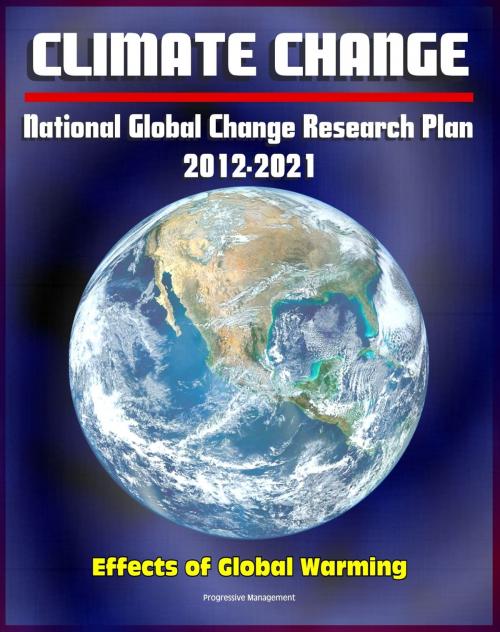Climate Change and Global Warming: National Global Change Research Plan 2012-2021: A Strategic Plan For The U.S. Global Change Research Program, Carbon Dioxide, Sea Levels, Ecosystems, Models
Nonfiction, Social & Cultural Studies, Political Science, Government, Public Policy, Science & Nature, Science, Earth Sciences| Author: | Progressive Management | ISBN: | 9781476147529 |
| Publisher: | Progressive Management | Publication: | May 9, 2012 |
| Imprint: | Smashwords Edition | Language: | English |
| Author: | Progressive Management |
| ISBN: | 9781476147529 |
| Publisher: | Progressive Management |
| Publication: | May 9, 2012 |
| Imprint: | Smashwords Edition |
| Language: | English |
This important new report from the United States Global Change Research Program outlines plans for studying climate change, global warming, and other global changes over the next decade. It includes dozens of examples of program accomplishments and topics, including carbon dioxide effects on seawater chemistry, climate oscillations, sea level rises, water resource management, adaptation and coastal flooding, climate models, and climate literacy.
Contents: Executive Summary * Introduction * Illustrative Examples of Program Accomplishments and Future Directions * Framework for USGCRP * USGCRP Vision and Mission * Overview * Framework for the New USGCRP * Goals and Objectives * Goal 1: Advance Science * Earth System Understanding * Climate Change and Global Change * Integration of the Biological Sciences * Integration of the Social, Behavioral, and Economic Sciences * Multiple Space and Time Scales, Natural Variability, and Extremes * Complexity, Thresholds, and Tipping Points * Science for Adaptation and Mitigation * Understanding Vulnerability to Global Change * Science to Support Regional and Sectoral Responses * Science to Support Global-Scale Responses * Tools and Approaches for Iterative Risk Management * Integrated Observations * Sustaining and Integrating Earth System Observational Capacity * Integrating Socioeconomic and Ecological Measurements * Integrating Observations and Modeling * Integrated Modeling * Model Complexity * Model Interpretation, Conceptual Modeling, and Hierarchies of Model Complexity * Integrated Modeling of Complex Systems Dynamics and Decision Support * Information Management and Sharing * Integrated and Centralized Data Access * Integrated Knowledge for Stakeholders and Decision Makers * Goal 2: Inform Decisions * Inform Adaptation Decisions * Inform Mitigation Decisions * Enhance Global Change Information * Goal 3: Conduct Sustained Assessments * Scientific Integration * Ongoing Capacity * Inform Responses * Evaluate Progress * Goal 4: Communicate and Educate * Strengthen Communication and Education Research * Reach Diverse Audiences * Increase Engagement * Cultivate Scientific Workforce * IV. International Cooperation * V. Implementation Strategy * Governance and Program Coordination * Program Planning and Implementation * Interagency Collaboration * Partnerships * Next Steps * Description by Agency/Department * Glossary of Terms * Acronym List
The environment is changing rapidly. Increases in world population, accompanied by industrialization and other human activities, are altering the atmosphere, ocean, land, ice cover, ecosystems, and the distribution of species over the planet. Understanding these and other global changes, including climate change, is critical to our Nation's health and economic vitality. Scientific research is critical to gaining this understanding. Research, along with an array of increasingly sophisticated tools for collecting and analyzing data, can provide essential knowledge to governments, businesses, and communities as they plan for and respond to the myriad manifestations of global change, including sea-level rise and ocean acidification, heat waves and drought, and the severe storms, floods, and forest fires that pose an ever-growing risk to life, property, and agriculture. To help fill this need, President Ronald Reagan created—and Congress in 1990 codified—the United States Global Change Research Program (USGCRP or Program), charged with providing a "comprehensive and integrated United States research program to assist the Nation and the world to understand, assess, predict, and respond to human-induced and natural processes of global change."
This important new report from the United States Global Change Research Program outlines plans for studying climate change, global warming, and other global changes over the next decade. It includes dozens of examples of program accomplishments and topics, including carbon dioxide effects on seawater chemistry, climate oscillations, sea level rises, water resource management, adaptation and coastal flooding, climate models, and climate literacy.
Contents: Executive Summary * Introduction * Illustrative Examples of Program Accomplishments and Future Directions * Framework for USGCRP * USGCRP Vision and Mission * Overview * Framework for the New USGCRP * Goals and Objectives * Goal 1: Advance Science * Earth System Understanding * Climate Change and Global Change * Integration of the Biological Sciences * Integration of the Social, Behavioral, and Economic Sciences * Multiple Space and Time Scales, Natural Variability, and Extremes * Complexity, Thresholds, and Tipping Points * Science for Adaptation and Mitigation * Understanding Vulnerability to Global Change * Science to Support Regional and Sectoral Responses * Science to Support Global-Scale Responses * Tools and Approaches for Iterative Risk Management * Integrated Observations * Sustaining and Integrating Earth System Observational Capacity * Integrating Socioeconomic and Ecological Measurements * Integrating Observations and Modeling * Integrated Modeling * Model Complexity * Model Interpretation, Conceptual Modeling, and Hierarchies of Model Complexity * Integrated Modeling of Complex Systems Dynamics and Decision Support * Information Management and Sharing * Integrated and Centralized Data Access * Integrated Knowledge for Stakeholders and Decision Makers * Goal 2: Inform Decisions * Inform Adaptation Decisions * Inform Mitigation Decisions * Enhance Global Change Information * Goal 3: Conduct Sustained Assessments * Scientific Integration * Ongoing Capacity * Inform Responses * Evaluate Progress * Goal 4: Communicate and Educate * Strengthen Communication and Education Research * Reach Diverse Audiences * Increase Engagement * Cultivate Scientific Workforce * IV. International Cooperation * V. Implementation Strategy * Governance and Program Coordination * Program Planning and Implementation * Interagency Collaboration * Partnerships * Next Steps * Description by Agency/Department * Glossary of Terms * Acronym List
The environment is changing rapidly. Increases in world population, accompanied by industrialization and other human activities, are altering the atmosphere, ocean, land, ice cover, ecosystems, and the distribution of species over the planet. Understanding these and other global changes, including climate change, is critical to our Nation's health and economic vitality. Scientific research is critical to gaining this understanding. Research, along with an array of increasingly sophisticated tools for collecting and analyzing data, can provide essential knowledge to governments, businesses, and communities as they plan for and respond to the myriad manifestations of global change, including sea-level rise and ocean acidification, heat waves and drought, and the severe storms, floods, and forest fires that pose an ever-growing risk to life, property, and agriculture. To help fill this need, President Ronald Reagan created—and Congress in 1990 codified—the United States Global Change Research Program (USGCRP or Program), charged with providing a "comprehensive and integrated United States research program to assist the Nation and the world to understand, assess, predict, and respond to human-induced and natural processes of global change."















